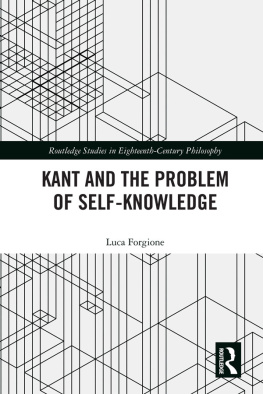
Bar-On, Dorit , Department of Philosophy, University of North Carolina, Chapel Hill
Speaking My Mind
Expression and Self-Knowledge
Print ISBN 0199276285, 2004
doi:10.1093/0199276285.001.0001
Abstract: This book motivates and develops a novel view of avowals and self-knowledge that attempts to give systematic answers to standing questions concerning our ability to know our own minds. Drawing on resources from the philosophy of language, the theory of action, epistemology, and the philosophy of mind, the author offers original and systematic answers to these questions. She proposes a Neo-Expressivist view according to which an avowal is an act through which a person directly expresses, rather than merely reports, the very mental condition that it tells of. She argues that this expressivist idea, coupled with an adequate characterization of expression and a proper separation of the semantics of avowals from their pragmatics and epistemology, explains the special status we assign to avowals. As against many expressivists and their critics, she maintains that an expressivist explanation is consistent with a non-deflationary view of self-knowledge and a robust realism about mental states. The view that emerges preserves many insights of the most prominent contributors to the subject, while offering a fresh perspective on our special relationship to our own minds.
Keywords: anti-deflationism,avowals,epistemology,expression,expressivism,philosophy of language,philosophy of mind,realism about mental states,self-knowledge,theory of action
end p.ii
Speaking My Mind
Expression and Self-Knowledge
CLARENDON PRESS OXFORD
2004
end p.iii

Great Clarendon Street, Oxford ox 2 6 dp
Oxford University Press is a department of the University of Oxford.
It furthers the University's objective of excellence in research, scholarship,
and education by publishing worldwide in
Oxford New York
Auckland Cape Town Dar es Salaam Hong Kong Karachi
Kuala Lumpur Madrid Melbourne Mexico City Nairobi
New Delhi Shanghai Taipei Toronto
With offices in
Argentina Austria Brazil Chile Czech Republic France Greece
Guatemala Hungary Italy Japan South Korea Poland Portugal
Singapore Switzerland Thailand Turkey Ukraine Vietnam
Oxford is a registered trade mark of Oxford University Press
in the UK and in certain other countries
Published in the United States
by Oxford University Press Inc., New York
Dorit Bar-On 2004
The moral rights of the author have been asserted
Database right Oxford University Press (maker)
First published 2004
All rights reserved. No part of this publication may be reproduced,
stored in a retrieval system, or transmitted, in any form or by any means,
without the prior permission in writing of Oxford University Press,
or as expressly permitted by law, or under terms agreed with the appropriate
reprographics rights organization. Enquiries concerning reproduction
outside the scope of the above should be sent to the Rights Department,
Oxford University Press, at the address above
You must not circulate this book in any other binding or cover
and you must impose this same condition on any acquirer
British Library Cataloguing in Publication Data
Data available
Library of Congress Cataloging in Publication Data
Data available
ISBN 0-19-926320-5
ISBN 0-19-927628-5 (pbk)
1 3 5 7 9 10 8 6 4 2
end p.iv
To my father, Elimelech Bar-On, to Manya,
and
To the memory of my mother Margalit, my aunt Malka,
my brother Palti,
and my friends Yael Barash and Ezra Moria
end p.v
end p.vi
Acknowledgements
I was led to the ideas developed in this work by seeking a systematic motivation and defense of the account of avowals presented in Bar-On and Long (). I am greatly indebted to Doug Long for numerous stimulating discussions on the status of avowals and self-knowledge, and for several years of philosophical conversation and collaboration.
The roots of the ideas go back further, to my time as a graduate student at UCLA, where I was fortunate to study closely with Tyler Burge (my dissertation advisor), Philippa Foot, Tony Martin, and David Pears. I owe them and my other teachers at UCLA a great intellectual debt. The particular combination of philosophical interests in language, mind, and knowledge that has led me to the present work goes back even further, to my undergraduate years in Tel Aviv, where I was turned on to analytic philosophy by Asa Kasher.
Of all my teachers, the one who has most influenced my thinking about the issues that occupy me in this work is Rogers Albritton. Seminars I took from Albritton while at UCLA and several marathon conversations with him have set me on a philosophical path to which I shall always find myself returning. I deeply regret not having been able to present this work to him before he died, especially given his generous encouragement at a crucial stage of its inception. But I find some comfort in the thought that he, of all people, would not have urged me to let go of it any earlier.
Three people provided close readings of the manuscript, intellectual support, and editorial help at various stages of this work. Bijan Parsia was my research assistant during the earlier stages of my work on the manuscript; I am grateful to him for his philosophical and editorial suggestions. Dylan Sabo has been my research assistant for the last two years. His help in preparing the manuscript for publication has been invaluable. Ram Neta, now my colleague provided extensive comments on a complete earlier draft of the manuscript, and later continued to read draft after draft of various chapters, never failing to offer insightful and challenging comments and constructive suggestions. I thank him for pushing me to go deeper and make myself clearer.
end p.vii
I also wish to thank colleagues and graduate students at UNC-Chapel Hill for intellectual stimulation and support, both direct and indirect, during the writing of this book. Several people have read earlier drafts of chapters and have given me feedback and helpful comments: Peter Alward, Simon Blackburn, Tony Brueckner, Tyler Burge, Brad Cohen, Nancy Daukas, Fred Dretske, Don Garrett, Brie Gertler, Bill Lycan, David Reeve, Keith Simmons, and Carol Voeller. My thanks to the participants in seminars on self-knowledge taught at UNC-Chapel Hill in 1996 and 2001, to Rogers Albritton and Richard Moran who commented on the paper presented by Doug Long and myself at the Pacific APA symposium on self-knowledge in March 1998, to the participants in a workshop on self-knowledge at UCLA in May 1998, especially David Kaplan, and to audiences at the University of South Carolina, the meetings of the North Carolina Philosophical Society, the College of William and Mary, Virginia Commonwealth, the meetings of the Canadian Philosophical Association, a conference on Language, Mind, and the World in Tlaxcala, Mexico, the University of Maryland, Davidson College (especially David Robb), UC Santa Cruz (especially Julia Tannenbaum), UC Santa Barbara (especially Tony Brueckner, Kevin Falvey, and Aaron Zimmermann), and to participants in a recent seminar at Duke University led by Fred Dretske and Guven Guzeldere. Special thanks to Mitch Green for many conversations, as well as comments he provided on some of the chapters, which have greatly helped shape my view on expression. Finally thanks to the editors at OUP, and especially to Peter Momtchiloff.










